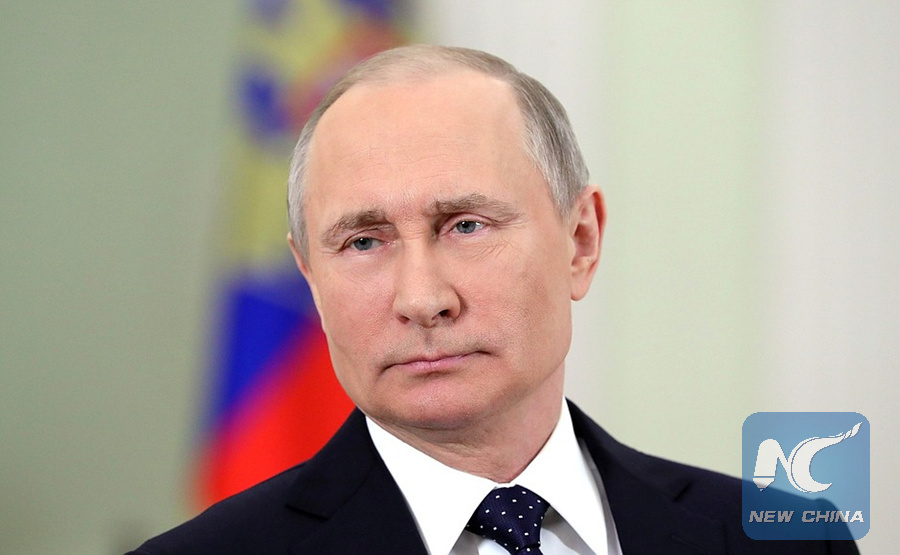
Russian President Vladimir Putin addresses the nation ahead of the presidential election slated for March 18. (Kremlin Photo)
MOSCOW, March 16 (Xinhua) -- Russian President Vladimir Putin is highly likely to be re-elected this weekend amid a spike in tensions with Britain, the United States and their allies.
According to a poll conducted by Russia's Public Opinion Foundation on March 12, the last survey before Sunday's election, 64.9 percent of the respondents said they would vote for Putin.
Putin was followed by the Communist Party's candidate Pavel Grudinin, who was supported by 6.7 percent of the respondents, and head of the Liberal Democratic Party Vladimir Zhirinovsky with 6.2 percent. The other five rivals had much weaker public support.
In accordance with Russia's law, a candidate who gets more than 50 percent of the ballots wins the once-in-six-year presidential election.
Russia's Central Election Commission said about 110 million Russian citizens have the right to vote in the upcoming race.
STRONG LEADER
Since Putin was elected president for the first time in 2000, Russia has recovered from the collapse of the Soviet Union and cemented its status as a big power.
With Crimea's incorporation into Russia and anti-terrorist operations in Syria, Putin has built up his prestige among Russians and gained additional influence in the global arena.
He has created a political system necessary to respond to any challenges, Alexei Mukhin, director general of the Center for Political Information, a Moscow-based think tank, said.
Under Putin, Russia has "returned to the great geopolitical game" and established a public-private two-tier economy that enabled it to withstand the 2008 financial crisis and Western economic sanctions since 2014, Mukhin said.
"Therefore, Putin has no competitors in Russia from the point of view of political weight and influence, which makes him a likely landslide winner in the presidential election on Sunday," Mukhin said.
But despite the achievements, Russia still faces a number of chronic social and economic problems.
The economy expanded 1.5 percent in 2017 after contracting by 0.2 percent in 2016. But the growth was still much lower than the global average of 3 percent. Russia still remains dependent on oil and gas sales.
Some 20 million Russians, or about 14 percent of the population, are living below the poverty line. The demographic situation is also worsening with the native Russian population declining.
"The well-being of people and comfortable incomes for Russian families are key development factors. This is where we need to make a decisive breakthrough," Putin said in an annual address to the parliament earlier this month.
EXTERNAL PRESSURE
Russian-Western rows have intensified ahead of the polling day over the Russian former spy poisoning case in Britain and alleged Russian interference in the 2016 U.S. presidential election.
On Wednesday, British Prime Minister Theresa May announced her country would expel 23 Russian diplomats due to alleged Russian involvement in the recent nerve agent attack on former spy Sergei Skripal.
She said no government ministers or members of the Royal family will attend the World Cup to be hosted by Russia this summer.
The United States, France and Germany have joined Britain in condemning Russia, and the European Union will hold a meeting next week to discuss responses to the alleged Russian chemical attack.
On March 15, the U.S. Treasury Department said it would levy sanctions against five Russian entities and 19 individuals, accusing them of having meddled in the 2016 U.S. presidential election and engaged in "malicious" cyber attacks.
Russia has repeatedly denied the British and U.S. allegations and demanded solid evidence.
Mukhin said Western countries may stir up anti-government protests following the election to damage the "prestige of the new Russian leadership and question the legitimacy of the election results."
"But they are unlikely to win popular support," he added.

